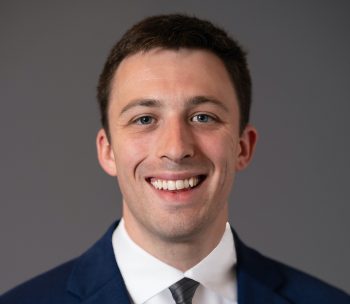2L Reflects on Tax Court Externship Andrew Dagen '22L got the chance to work in the United States Tax Court in Washington D.C. after it reopened virtually this fall.
Andy Dagen ’22L is from Nashville, Tennessee. He attended the University of Tennessee, where he received a B.S. in Accounting. After college, he practiced as a certified public accountant for five years in Nashville, Tennessee and Durham, North Carolina. At W&L, he is on the German Law Journal and is the Treasurer of the Tax Law Society. Andy lives in downtown Lexington with his wife, Sarah, and two dogs, Scout and Charlie.
Where did you work this fall?
I was an extern for the Honorable Juan F. Vasquez at the United States Tax Court in Washington, D.C. Due to COVID-19, my externship was fully remote.
How did you secure this position?
During my second semester of my 1L year, I applied for Summer 2020 internships. I initially planned to split my time between the Tax Court and a bankruptcy court, but, due to COVID-19, the Tax Court internship was cancelled. When I returned to school in the fall, the Tax Court reopened virtually, and I was offered a position through the extended winter break. Dean Hellwig, who teaches tax law, connected me with Judge Vasquez.
Describe your work experience.
I enjoyed my six weeks in chambers. I researched precedent and statutes, wrote an opinion, and received feedback through reviews with the clerk and the judge. The clerk and I met two to three times a week to discuss my progress on the opinion, and the entire chambers met once a week to check-in and get to know each other. I read daily tax news that included revenue rulings, current cases, and day-of opinions about to be released to the public.
What were some skills you developed this fall?
Through this externship, I honed my writing and research skills. I learned to spot issues and adapted to a structured and standardized style of certain tax opinions. This style was different than the style used when researching and writing opinions for the bankruptcy court. Both positions required critical thinking combined with research and writing, but tax court work required a practical and succinct style.
What surprised you about the work you did this fall?
Judge Vasquez’s wife wrote a biography about his life. In the appendix, there is a section listing the Judge’s clerks, interns, and externs, and I somehow made it onto the list just before the book was published and printed. That was an honor, and I am excited to read the book. Most importantly, Judge Vasquez’s down-to-earth, kind, and open demeanor surprised me. He never missed an opportunity to ask everyone in the virtual room how they were doing and what he could do to help them. His memory of every person that had ever been in his chambers was amazing.
What was your favorite aspect of your fall work experience?
My favorite part of this experience was simply meeting with Judge Vasquez and his clerk regularly. It was invaluable listening to them talk about previous cases and collaborating with them to write an opinion. Judge Vasquez is very wise, optimistic, and gracious. He was patient with me, shared many stories, and answered my questions. There was also a virtual holiday party with all the judges and clerks of the court, which was another great way to meet more people.
Has this experience helped you figure out your post graduate plans, and if so how?
I came into law school thinking I wanted to be a tax attorney, although I kept an open mind to other practice areas. This experience confirmed my desire to work in tax law. I also have new interests in tax controversy and planning and want to work at a firm with these practice areas. This summer, I will work at a tax firm in North Carolina.
 Andy Dagen
Andy Dagen
You must be logged in to post a comment.